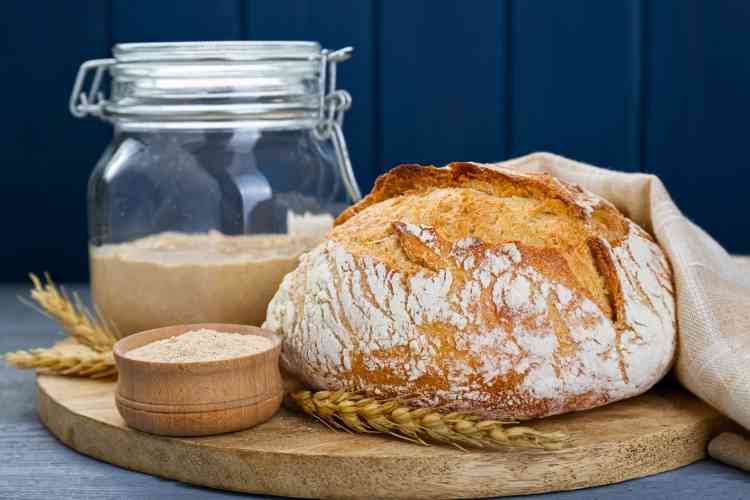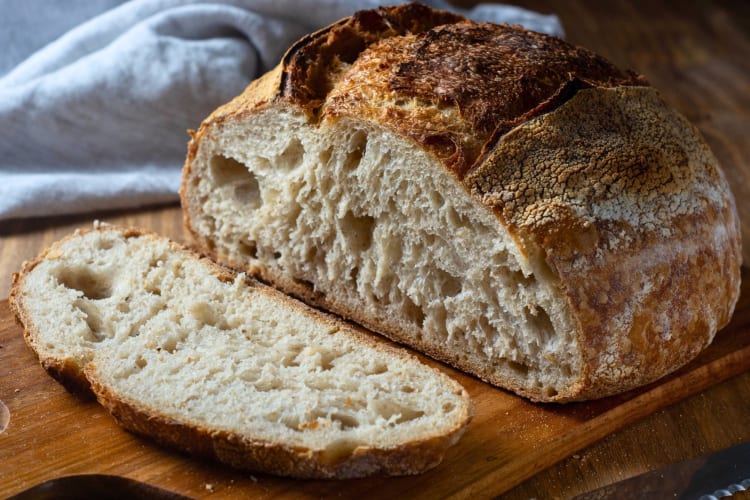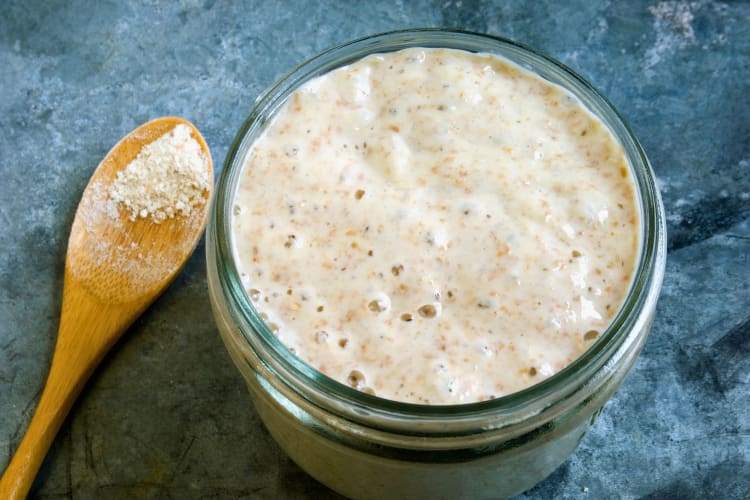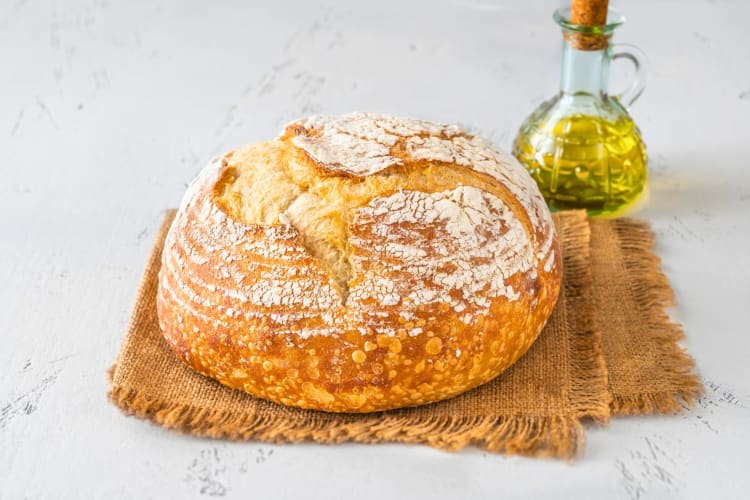Is Sourdough Bread Healthy for You?

Is sourdough bread healthy to consume on a regular basis? What makes it different from other types of bread? We’ve gathered the top facts to know about this popular, centuries-old leavened bread.
You’ve probably heard about how sourdough bread is healthier compared to more processed breads like white bread, mainly because of its traditional fermentation process.
This kind of bread has risen in popularity in recent years, partly due to the pandemic, as people turned to baking at home and partly because of its potential health benefits. It’s found in most grocery stores and bakeries, but can also easily be made at home.
Still, with all the health trends going on these days, it’s important to ask: “Is sourdough bread healthy for you?” Is homemade sourdough bread healthier in different ways than store-bought? What are the specifics to look at when it comes to deciding if sourdough bread is healthy, and for whom? Let’s dig into the answers.
Jump to Section
- Is Sourdough Bread Good for You?
- How Healthy is Sourdough Bread for You?
- What Are the Health Benefits of Sourdough Bread?
Is Sourdough Bread Good for You?
In general, one may wonder: Is sourdough bread healthy for you? While most might guess that it is, especially compared to other kinds of bread, the answer is more complicated.
The scientific evidence available today isn’t strong enough to confirm that sourdough bread is healthy or that it’s the healthiest bread choice. Back in 2022, The National Library of Medicine (NLM) published a systematic review about the nutritional benefits that sourdough bread offers.
However, the reviewed studies had too many varied factors to be compared effectively, which made it difficult to draw conclusive results about whether sourdough bread is healthy to consume on a consistent basis. Some studies show that fermentation can improve nutrient availability and digestibility, but the degree of benefit varies depending on the flour and process used.
While the health benefits of this bread do seem to exist, more research needs to be conducted before we truly understand the answer to the question: Is sourdough bread good for you? There are lots of factors to consider, including how the sourdough is made and whether someone has underlying health conditions.
Another related question could be: “How and why is sourdough bread healthy for some, and how do we expand on those benefits for everyone?” Unfortunately, only future research will tell.

Is Homemade Sourdough Bread Healthy?
When asking: “Is sourdough bread healthy?”, you’ll likely be wondering: “Is homemade sourdough bread healthy?” You may also want to know if making sourdough bread at home results in a healthier loaf than those sold in stores.
Sourdough is healthy in its simplest form, made from just flour, water and salt. Making it at home means having full control of the ingredients going into it, and the quality of your starter.
Buying it from a store or bakery means, unless otherwise stated, that there’s a higher likelihood of preservatives and other ingredients getting added. Of course, certain grocery stores or artisanal bakeries might use higher-quality ingredients.
So, is sourdough bread healthy when you make it at home, or is it better to buy it in-store or at a bakery? Overall, homemade sourdough can be the healthier choice, depending on the ingredients used and portion size. But there are key differences to consider, like preparation time and preferred ingredients.

Is Sourdough Bread Healthy for Diabetics?
Is sourdough bread healthy for diabetics? It definitely can be. Sourdough bread made with whole grains may be a better choice for those managing diabetes than refined white breads because it typically has a lower glycemic index (GI).
This lower GI comes from the natural fermentation process, which changes the structure of carbohydrates in the dough. As a result, sourdough is healthy in the sense that its natural fermentation can make carbohydrates digest more slowly, leading to a gradual rise in blood sugar rather than a sharp spike. The fermentation also increases beneficial compounds like organic acids and may slightly boost the bread’s resistant starch content.
Now, you may be wondering: “Is sourdough bread healthy for those with Type 1 and Type 2 diabetes?” The answer is often yes — sourdough is healthy for many people with diabetes when portion size and overall diet quality are considered. For those with Type 2 diabetes, research summarized by SingleCare suggests that eating sourdough bread later in the day may help manage blood sugar, as insulin sensitivity tends to be lower in the evening.
So, why is sourdough bread healthy if you have diabetes — and could it benefit those who are pre-diabetic or insulin-resistant? In essence, its lower glycemic response and ability to support steadier blood sugar levels make it a smart alternative to conventional bread. As always, portion control matters, and it’s best to consult a healthcare provider for individualized guidance.

How Healthy is Sourdough Bread for You?
Is sourdough bread healthy for you, nutrition-wise? Now that we’ve gone through the more general potential health benefits of this bread, it’s time to look at the details. According to the USDA, this is the nutritional profile for one regular slice of sourdough bread at 31 grams:
- Protein: 3.33 grams
- Fat: 0.75 grams
- Carbohydrates: 16.1 grams
- Fiber: 0.682 grams
- Total sugars: 1.43 grams
- Sodium: 187 milligrams
- Iron: 1.21 milligrams
Of course, the nutrition from a slice of sourdough varies depending on factors like the type of flour used, sugars and other ingredients added, and whether the bread was baked at home or in-store, as well as the health history of the person eating it.
In addition to these statistics, is sourdough bread healthy as a source of other vitamins and other components? The good news is that yes, both homemade and store-bought sourdough breads show why sourdough is healthy, as they can provide small amounts of:
- Calcium: Strengthens bone health.
- Potassium: Regulates cell functions, proteins and carbohydrates.
- Magnesium: Regulates muscles, nerves, blood sugar and protein levels.
- Folate: Helps divide cells and make DNA.
Given these nutritional facts, is sourdough bread healthy for most people? When combined with a balanced diet, it undoubtedly has the potential to be. There’s a reason why it’s one of the healthiest bread options to choose from.

What Are the Health Benefits of Sourdough Bread?
Sourdough is healthy as an alternative to highly processed bread, especially when made with whole grains. In particular, when made through a traditional, slow fermentation process, it can be easier on digestion, have a lower glycemic response and make some nutrients more bioavailable.
So if you’re wondering about how to start eating healthy, incorporating breads like this one is a great jumping-off point. Let’s take a closer look at some of the top potential health benefits it offers.
Antioxidants
Is sourdough bread healthy when it comes to supporting overall wellness? Some research suggests that part of why sourdough is healthy may come from its fermentation process, which can increase antioxidant compounds, though evidence is still preliminary.
The fermentation process produces organic acids and increases antioxidant compounds that can help reduce oxidative stress, a factor linked to chronic inflammation and metabolic issues. These effects may contribute to better long-term health when eaten as part of a balanced diet.
To explore these potential benefits further, consider learning how to make your own sourdough at home by checking out online bread-making classes.

Improved Nutrient Bioavailability
Is sourdough bread healthy from a nutritional standpoint? Its unique fermentation process can help reduce compounds called anti-nutrients, such as phytic acid (phytate), which naturally occur in grains and can limit the absorption of certain minerals.
Through fermentation, phytate levels are lowered, which may improve the body’s ability to absorb minerals like iron, zinc and magnesium. This process can also make sourdough bread easier to digest for some people compared to conventional breads.
To try your hand at fermenting and baking your own sourdough bread, consider taking one of the cooking classes near you.

Lower Glycemic Index (GI)
Is sourdough bread healthy because of its lower glycemic index (GI)? Compared to processed breads, sourdough’s slower carbohydrate digestion leads to a more gradual rise in blood sugar. This steady response can be beneficial for people managing blood sugar levels, helping reduce rapid spikes that can contribute to insulin resistance over time.
The best part? Swapping your bread choice doesn’t have to mean sacrificing flavor. You can still whip up versions of your favorite dishes like sourdough French toast, sourdough waffles or even jalapeño cheddar sourdough bread.

Gut Health
Is sourdough bread healthy for your gut? When considering prebiotic vs. probiotic benefits, sourdough fits more into the prebiotic category. Although the live starter used to make sourdough is rich in probiotics, these beneficial bacteria don’t survive the baking process, meaning baked sourdough bread is not a direct source of probiotics like kimchi.
Sourdough is healthy for gut balance because its prebiotic compounds may nourish beneficial gut bacteria, and fermentation can raise levels of resistant starch and fiber. Additionally, fermentation partially breaks down gluten and FODMAPs — types of carbohydrates that can cause bloating — making sourdough easier to digest for some people with mild gluten sensitivities.
It’s important to note, however, that sourdough still contains gluten and is not safe for individuals with celiac disease. Only certified gluten-free sourdough made from non-wheat flours is suitable for those following a strict gluten-free diet. Wholegrain sourdough also adds extra fiber for gut-friendly benefits.

Now you know the ins and outs of the question: “Is sourdough bread healthy for you?” From the current consensus in scientific research to the effects it can have for those who are diabetic, along with general health benefits, there’s a lot to consider.
When it comes down to it, this age-old bread has many properties that make it a worthy choice as part of a regular, balanced diet. For many, sourdough bread is a healthy option, whether it’s enjoyed once in a while or regularly throughout the week. Plus, it’s rewarding to make at home.
For even more ways to explore your favorite foods, check out other experiences happening on Cozymeal.
